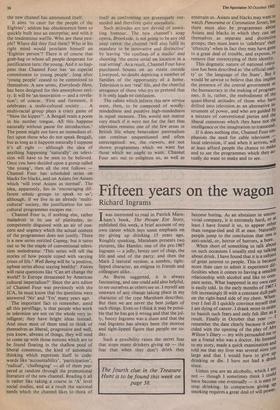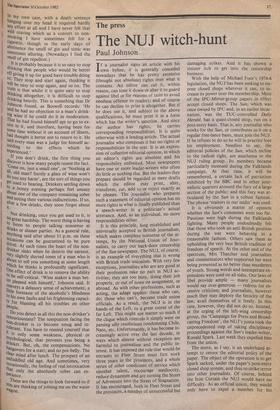Fifteen years on the wagon
Richard Ingrams
T was interested to read in Patrick Marn- 1 ham's book, The Private Eye Story, published this week, a brief account of my own career which lays some emphasis on my giving up drinking 15 years ago. Roughly speaking, Marnham presents two pictures, like Hamlet: one of the pre-1967 Ingrams — a jolly, boozy sort of chap, the life and soul of the party; and then the Mark 2 teetotal version: a sombre, tight- lipped character, an enigma to friends and colleagues alike.
As Burns suggested, it is always fascinating, and one could add also helpful, to see ourselves as others see us. I myself am unaware of any change taking place in my character of the type Marnham describes. But then we are never the best judges of such things. Even so I think it may be possi- ble that he has got it wrong and that the jol- ly, boozy Ingrams was a sham and that the real Ingrams has always been the morose and tight-lipped figure that people see to- day.
Such a possibility raises the secret fear that stops many drinkers giving up — the fear that when they don't drink they
become boring. As an abstainer in uncoil- vivial company, it is extremely hard, or at least I have found it so, to appear other than tongue-tied and ill at ease. NaturallY people jump to the conclusion that one Is anti-social, or, horror of horrors, a bore. When short of something to talk about on such occasions I usually end up talking about drink. I have found that it is a subject of great interest to people. This is because more than care to admit it experience dif- ficulties when it comes to having a sensible relationship with alcohol and like to com- pare notes. What happened in my own ease, is easily told. In the early months of 1967.1 felt increasingly ill with a constant dull POI on the right-hand side of my chest. When- ever I feel ill I quickly convince myself 11131 I am dying of cancer. I drank more in order to banish such fears and only felt iller as a result. Finally in October that year remember the date clearly because it coin- cided with the opening of the play of Mrs Wilson's Diary — my wife persuaded me t°, see a friend who was a doctor. He listened to my story, made a quick examination and told me that my liver was several sizes too large and that I would have to give Yr, drinking or die. I have not had a drink since.
Unless you are an alcoholic, which I ani, ,
not — though I sometimes think I could have become one eventually — it is easy to stop drinking. In comparison giving "P smoking requires a great deal of will power'
In - own case, with a death sentence hanging over my head it required hardly any effort at all and I have never felt that Wild craving which as a convert to non- smoking I have sometimes felt for a cigarette, though in the early days of abstinence the smell of gin and tonic was
sometimes alluring. (Nowadays I find the smell of gin repellent.)
It is probably because it is so easy to stop drinking that people who would be better off giving it up for good have trouble doing so, They stop and start again, thinking it will be easy to stop again, and so on. The truth is that whilst it is quite easy to stop drinking altogether, it is difficult to stop drinking heavily. This is something that Dr Johnson found, as Boswell records: 'He said he had no objection to a man's drink- ing wine if he could do it in moderation. That he had found himself apt to go to ex- cess in it, and therefore, having been for some time without it on account of illness,
had thought it better not to return to it. He said every man was a judge for himself ac- cording to the effects which he experienced.'
If You don't drink, the first thing you discover is how many people resent the fact. 'Come on, just a small one', or 'Nothing at all, old man? Surely a glass of wine won't do You any harm', are the sort of things you get used to hearing. Drinkers settling down to a boozy evening perhaps feel uneasy about one of the company remaining sober and noting their various indiscretions. If so, after a few drinks, they soon forget about it.
Not drinking, once you get used to it, is no great hardship. The worst thing is having to listen to people talking nonsense at drinks or dinner parties. As a general rule,
anything said after about 11 p.m. on these Occasions can be guaranteed to be pure
drivel At such times the heart of the non- drinker sinks when he detects the earnest,
very slightly slurred tones of a man who is about to tell you something at some length
which he thinks is profoundly significant. 'CIrle effect of drink is to remove the ability to be self-critical. 'Wine makes a man bet-
ter Pleased with himself,' Johnson said. It onveys a delusory sense of achievement, a little foretaste of the alcoholic's blindness to his own faults and his frightening capaci- tY for blaming all his troubles on other People.
Do You detect in all this the non-drinker's censoriousness? The temptation facing the non-drinker is to become smug and in- tolerant. You have to remind yourself that
it is only some weakness, physical or
nsYehological, that prevents you being a drinker. But, oh, the compensations. No hangovers for a start; and no pot-belly. The clear mind after lunch. The prospect of an nnfuddled old age. And sometimes, very °ceasionally, the feeling of real intoxication that only the absolutely sober can ex- Perience. These are the things to look forward to if You are thinking of joining me on the water Wagon.











































 Previous page
Previous page